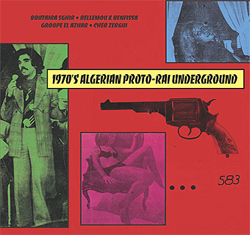|
1970s Algerian Proto-Rai Underground
|
|
Various artists In 2008, Sublime Frequencies released 1970s Algerian Proto-Rai Underground on vinyl only. This year, we get the CD version. The label is dedicated to tracking down rare music that has been neglected by the West, and they often emphasize music that explodes from the streets of cities and exotic oases – whether from Morocco, India, Iran, the Sahara, or Thailand. Some of the label's releases have also drawn on radio broadcasts, providing a snapshot of what is being filtered over the airwaves of the world. The crate-diggers, sound collectors, and ethnographic filmmakers of the Sublime Frequencies roster thus bring their sensibility to bear in preserving both present moments and historical releases, and even their travelogue releases on DVD are often head-swimmingly dreamy in capturing the sights and sounds of foreign cultures. With 1970s Algerian Proto-Rai Underground, the listener is treated to rai singles from that era, and the cover art encapsulates a feeling of danger that a punk fanzine might emulate: grainy shots of women are juxtaposed next to a singer in what could be a nightclub/basement, but it is a picture of a gun which seems to emphasize the 'underground' here. Visually, this is sleazy, sensational stuff. We might well inquire, then, what the 'proto' prefix refers to in the title of this release. Rai music's genesis can actually be traced back to the 1930s in Algeria, and from the start, the music was a hotbed of influences that flourished in the port of Oran. While we might think of rai music today in terms of the artists who seem to epitomize the scene and have blessed it with international success – such as Rachid Taha, Khaled, and Cheb Mami – early rai was rife with diversity. Arabic music rubbed shoulders with Spanish, Jewish, and French cultures. While 1970s Algerian Proto-Rai Underground focuses on key players of the era, such as Bellemou and Benfissa, Cheb Zergui, and Groupe El Azhar, and Boutaiba Sghir, the voices are all men. Again, this was not the case in early rai music, as there were some female vocalists who would perform in public (with the late Cheikha Remitti being a wonderful example of a woman's voice in the rai genre, unafraid to address social and sexual issues). Groupe El Azhar - "Mazal Nesker Mazal" As rai developed as a popular music form, it found itself responding to city and rural life, and colonization and Algerian identity. Singers would decry lives spent in poverty, and – whether male or female – they would not shy away from singing about sex, or of alcohol (Groupe El Azhar's “Mazal Nesker Mazal/I'm Still Getting Drunk…Still” makes the latter point), which would not sit well with either strict religious Islam or whomever was in charge of the government. Plus, rai was danceable: a sure-fire route to damnation, depending on one's religious or ideological viewpoint. The 1970s-era of rai music was grappling with censorship imposed by the government (and female rai stars faced increased restrictions); it is probably no surprise that for rai singers to espouse any kind of criticism of the government, or to give voice to their raw lifestyles, would invest the music with subterranean allure. In short, rai was a music that became associated with outcasts, and in its current incarnation mixes electric instruments and, sometimes, synthesized dance rhythms with vocalists that reflect the brashness of western punk. Bellemou and Benfissa - "Li Maandouche L'Auto" 1970s Algerian Proto-Rai Underground shines a spotlight on rai music during a transitional phase. The more electronic dance beats that would find a market in the 'world music' niche of the late 1980s are not present here, but what one gets is a portrait of the gritty updating of the genre. The sound across the tracks really pulls back the veil on an age, with deep, transfixing percussive rhythms. And the trumpets (Bellemou Messaoud's distinctive contribution to rai as a pop genre): expect crisp, solid blasts at every turn, the kind that make it sound as if you've stumbled into an illicit back alley cabaret. There's some use of electric guitar, and certainly organ and accordion, filling out the music. Throughout, the vocals are impassioned (i.e., Sghir's “Dayha Oulabes/I'll Marry Her Whether They Like It Or Not” has the clear swagger of intent, and some 'proto'-Rachid Taha vocal swoops). Sghir - "Dayha Oulabes" The last track, Cheb Zergui's “Ana Dellai/I Cuddle Myself” is positively woozy, and the most 'western' to my ears; coming from the latter part of the '70s, it has a hypnotic, badass groove and some funky guitar that combine in a slow, slinky streetwise strut. All in all, Sublime Frequencies' compilation confirms that the heat of popular cultural forms burns bright under the glare of those who try to stamp out its fire. – Lee Blackstone Cheb Zergui - "Ana Dellai"
|

|
|
|